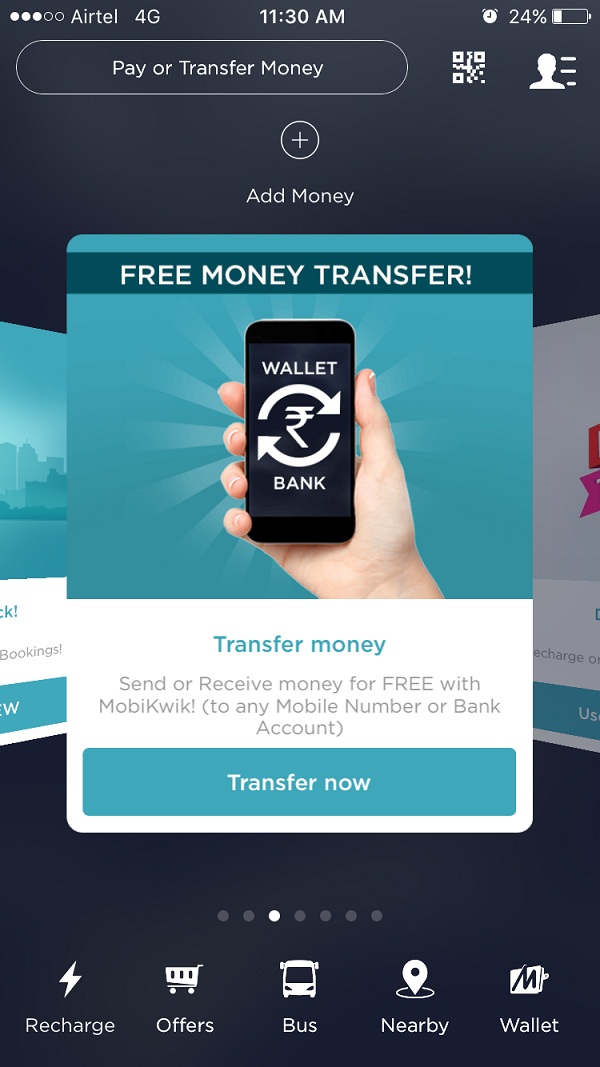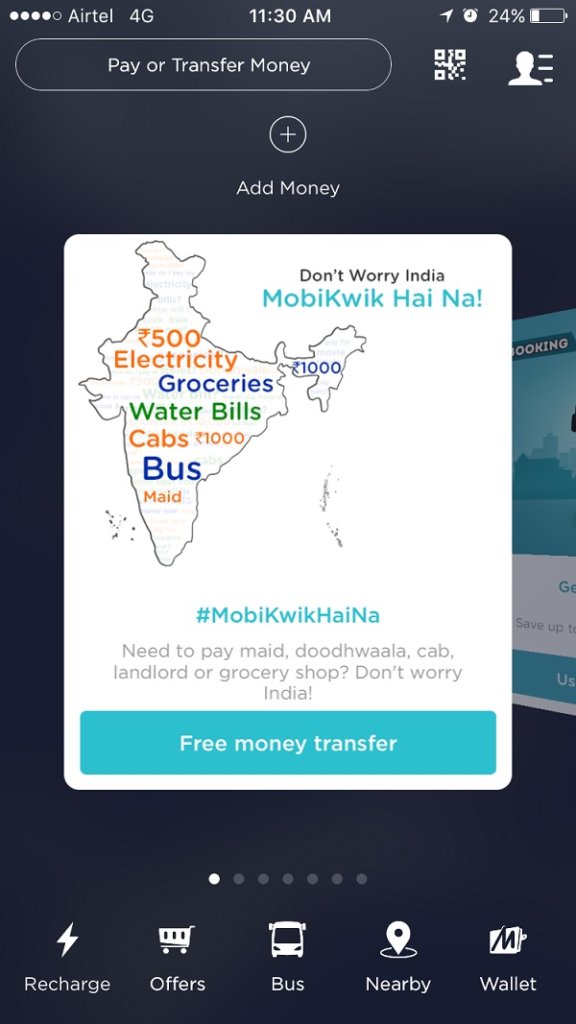
[Note: This article is part of The Junction Series. We will be covering the FinTech sector in detail at The Junction 2017 in Jaipur. Learn more about The Junction here!]
“The chains of habit are too weak to be felt until they are too strong to be broken.” ― Samuel Johnson
With reference to the current demonetisation regime, this adage aptly demonstrates the difficulty people, who are so accustomed to cash, are facing in switching to digital payments. While wallet players are rejoicing at the sudden surge in uptake of wallets as a result, at the same time, they are also coming to terms with the fact that this could possibly be their one big chance to break an entire people’s age-old habit of dealing in cash.
How permanent this behavioural change will be is a matter of speculation. But for the moment, wallet players are throwing their full weight in the ring to help people cross over the bridge from hard cash transactions to no cash transactions.
 One such player is MobiKwik which has claimed to witness an 18X surge in transactions in the last fortnight; and is looking forward to making the most of it. Says Bipin Preet Singh, CEO, “Indian users do a trillion US dollars’ worth of payments annually and more than 90% of them are in cash. With this policy change, we expect a 10X impact – we expect to easily hit $10 Bn in payments volume by 2017-18.”
One such player is MobiKwik which has claimed to witness an 18X surge in transactions in the last fortnight; and is looking forward to making the most of it. Says Bipin Preet Singh, CEO, “Indian users do a trillion US dollars’ worth of payments annually and more than 90% of them are in cash. With this policy change, we expect a 10X impact – we expect to easily hit $10 Bn in payments volume by 2017-18.”
With 40 Mn downloads, it appears that MobiKwik is all set to ambitiously go full throttle in leveraging the incoming surge in digital payments in India. As per a recent report by Google and Boston Consulting Group, the digital payments industry in India is projected to reach $500 Bn by 2020, contributing 15% to India’s GDP. Add to it the effects of demonetisation, and this target might be achieved sooner than predicted.
When MobiKwik started out in 2009, there were two problems it was looking to solve specifically. The first problem was that people in India did not have a convenient way to recharge their phones – they would have to run to the shopkeepers. The whole thing did not make any sense – if you already have a mobile phone with Internet then shouldn’t you be able to recharge on your own?
The whole thing did not make any sense - if you already have a mobile phone with Internet then shouldn’t you be able to recharge on your own?
The second problem that mobile payments in general had very poor performance. If anyone wanted to pay by card or net banking on his mobile phone, then it was hard to pay as Internet connections fluctuated, the mobile screens were inconveniently small and half the time transactions would not go through.
The startup was trying to solve the two parallely and, over the course of time, it realised that they were related. Along the way Google released Android which enabled it to target its services to a very large number of users. Subsequently, with a Prepaid Payment Instruments (PPI) license, commerce started taking off and thus began MobiKwik’s journey into payments.
In a candid conversation with Inc42, Mrinal Sinha, COO, speaks about the scope and challenges in the payments sector and how wallet uptake is poised to grow post-demonetisation.
This interview has been edited for length and clarity.
Inc42: What were some of the initial challenges that you faced while attempting to strike fresh ground in the payments space?
Mrinal: There were several challenges – each stage of the company has a different challenge. When we were starting out and trying to solve the problem of success rate of mobile payments in collaboration with banks, they had apprehensions as to why should they work with us.
Slightly later when we were trying to gain acceptance with ecommerce merchants, they would say that mobile wallets don’t really work, so why should they accept mobile wallets? In 2015-16, the challenges were of a different nature which was that while we were integrating mobile wallets with the businesses of offline companies basically retailers, restaurants, coffee shops, these businesses are characterised by high staff churn. This acted as a roadblock to educating the staff as many did not know how to payments work.
Inc42: Tell us about the typical consumer profile you had in mind for a MobiKwik customer.
Mrinal: Because we were online, mobile and app-driven, by virtue of that channel, the segment chose itself. It was necessarily the 25-35-year–old who was familiar with technology, who were used to downloading apps for doing different things. So the choice of our business itself meant that we were choosing a specific age group and while we have users all across India of all different ages, but in terms of our highest number of users, it will be this particular segment.

About 20%-30% of our users are in the top five-six cities of India. The next 100 cities will have another 20%-30%. What’s interesting is we have a lot of users from far-flung places as Nagaland. We even have visually impaired users using the app as some of our features are very intuitive for them. So, while the general assumption would be that we cater to a very specific segment, the point is that a platform like this can be used by anybody.
Inc42: How has the growth path been in terms of traction and app downloads?
Mrinal: We have been growing roughly 2x-3x every year. We have about 40 Mn registered users now, downloads would be a bit higher. We are about to touch half a billion in payments processed already. Over the next year, we expect our volumes to rise hundred fold.
Our platform is now powering many known merchants such as IRCTC, Uber, Grofers, Meru Cabs, Big Bazaar, OYO Rooms, Zomato, Swiggy, PVR, BookMyShow, Grofers, Big Basket, ShopClues, Myntra, Jabong, Pepperfry, Food Panda, GoDaddy, and MakeMyTrip, among others. It’s very simple for merchants to use MobiKwik. Even if you have a 2G network, you can be up and running in five minutes.
Inc42: Given the rise of numerous formidable players such as Paytm and Freecharge, what is MobiKwik’s USP that places you in a different league?
Mrinal: We have been big fans of sticking with what we do well and just staying there. Some of our competitors are in other businesses as well, doing so many things at the same time. We know what our primary business is payments and our merchants respect and trust us because of that and want to work with us on account of that single-minded focus. Some of our competitors, because they are in other businesses are seen as potential competitors by the merchants and thus they have stayed away from them.
Also we have been constantly innovating in payments and we are clear that we are all about payments. This has helped us a lot to record one of the best payment performances in the industry – be it merchant acceptance or volumes or the integrations that we have provided. A lot of government departments are also signing up to do payments with us.
Inc42: How is the payments space going to shape up post-demonetisation? What is going to be the scope?
Mrinal: The sectors that are essential services such as cooking gas, groceries, will be the first to adopt payments now at a very large scale. Also, the government is very supportive, so you will see lot of government payments come on to mobile wallets in a very big way.
We were trying to push hard to create everyday payment solutions, be it paying for your cab or petrol or cooking gas. It has been hard to convince merchants that we are a good option to try.
Because people have been accustomed to use cash as an alternative for centuries, even though it is inferior in many respects, it was difficult to convince people to try digital payments on a scale. Merchant after merchant, we had to do the convincing; the same went for users.
So all of a sudden because of demonetisation, more and more people, even the older age groups, want to try and see what it is. And we believe once they try it, they will be hooked on to us. The first barrier is for them to try, once they do, they will realise how useful it is.
Inc42: With the increase in digital payment uptake, do you see India going fully cashless or is it a distant dream?
Mrinal: We are very certain that a large chunk of the population over the next couple of months will go cashless – even people who have always used cash.
People will realise that hard cash isn’t as safe as it used to be. Secondly, with a lot of people trying mobile wallets in the short term and realising how easy are they to transact compared to writing/depositing cheques or even swiping a card, they will use it more often.
Also, because of demonetisation, people now have a strong incentive to use mobile wallets, leading to change in behavioural patterns. Thirdly, small and big merchants, whether private or in PSUs, will start adopting mobile wallets in some fashion. This large scale merchant acceptance will further goad people into using wallets instead of relying on cash. Because of these, the effect is going to very very permanent.

Inc42: MobiKwik has also integrated UPI on the platform recently. How do you think will the coming of UPI affect the wallet space?
Mrinal: UPI is like a backend switch. Think of it as Visa or Mastercard. It does not give out cards on its own, it’s the banks which do so. Similarly, UPI is a way for payment providers to access all kinds of services for which payments need to be made to different institutions. So people who need payment will connect to that switch and people who process payments will connect to that switch.
But you will still need somebody interacting with the customer who can basically create very easy-to-use payment experiences for the customer – like one tap payment or the mobile number to make that payment. Who will enable that frontend? That will happen on some layer like an app or on a website or a wallet. And that’s where wallets come in.
Inc42: What measures is MobiKwik taking to foster uptake of digital payments beyond Tier I and Tier III cities in rural areas?
Mrinal: We are actively working on that problem. We have partnered with several NGOs to enable rural people who are afraid of going to bank branches. Banks are procedure-oriented and this strata, which is generally confounded by them, generally don’t feel very welcome in the banks. It doesn’t help that one has to fill up numerous forms for everything. So, in partnership with NGOs we are creating m-gullak accounts, which is essentially a MobiKwik account and people can save through them. About 5K-6K people in rural areas are part of this initiative and we are scaling it up.
Inc42: What would you say are the major challenges in building a fintech startup in India?
Mrinal: To incorporate a company is still hard – the barrier remains in the ease of doing business. Also, the barriers to scaling up are immense in India. There are a number of laws such as to do x, you need y amounts of money or net worth. And some of these laws are not that well detailed.
Very often regulatory bodies do not have people who are from the industry, so they end up making laws which require huge capital for incorporation. For a regulator who has never run a business and has only looked at balance sheets of PSUs, they do not understand this. For them, they feel if a PSU bank has this much net worth, so every business should have that much.
If you look at UK, they have Internet banks where the net worth requirement is less than the payment banks in India. Therefore, the logic behind some of these regulatory barriers needs to be more thought out and be more SME-friendly. Because at the end of the day, we are a developing country where the size of businesses is small. So, from a regulatory standpoint, we should remove capital constraints as much as possible without creating a risk for the system.
Also, the incumbents in India, which is the banks, historically they have been slow to innovate. A lot of banks have been lobbying against allowing wallets to connect directly to UPI. They don’t provide services that are good enough so they want to compete with wallets on an unequal basis. Regulators should be able to discipline these incumbents who have a lot of market power. They should be able to tell them that either you change or you become irrelevant.
Inc42: What is your focus in the coming months, as far as product enhancements are concerned?
Mrinal: As demonetisation is going on, all our new technologies and product enhancements are focussed on easing the pain for Indian merchants and businesses for the next six months. It means we will be finding newer ways to reach those merchants, developing better processes to get merchants to start accepting digital payments, and enable wallet payments right from your local chemists shops to national highways.































 Ad-lite browsing experience
Ad-lite browsing experience